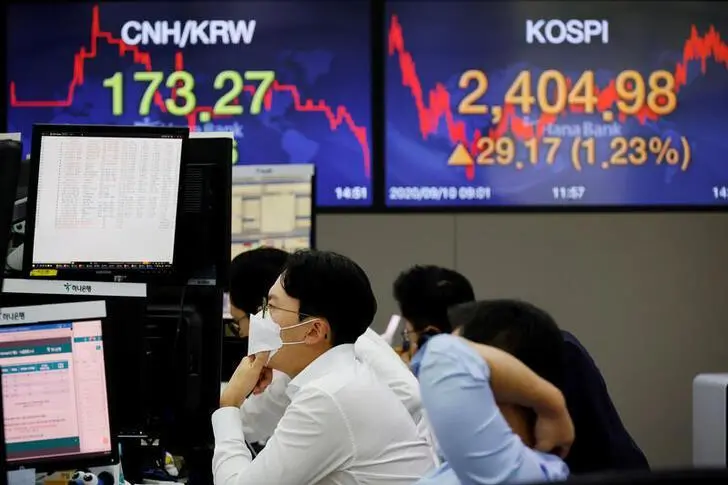PHOTO
Round-up of South Korean financial markets:
** South Korean shares recouped early losses to end marginally higher on Thursday, as foreigners scooped up chip and auto stocks even though investor doubts over the government's corporate reform plan persisted.
** The won weakened and the benchmark bond yield rose, after higher-than-expected U.S. inflation data.
** The benchmark KOSPI closed up 1.80 points, or 0.07%, at 2,706.96, after falling as much as 1.6% in early trade.
** Foreigners were net buyers of shares worth 1.06 trillion won ($776.41 million) on the main board, their biggest daily purchase since March 21.
** Chipmaker Samsung Electronics rose 0.60% and peer SK Hynix jumped 3.01%. Hyundai Motor and sister automaker Kia Corp climbed 5.70% and 3.43%, respectively.
** U.S. consumer prices rose more than expected in March, data showed on Wednesday, with markets now expecting the Federal Reserve to delay cutting interest rates until September.
** The benchmark index rebounded during the session, led by shares of major exporters whose earnings are expected to remain robust despite a delay in U.S. rate cuts, analysts said.
** The South Korean parliamentary election, in which liberal opposition parties' landslide victory dealt a blow to President Yoon Suk Yeol and his conservative party, did not move the needle much.
** "The market had started to price in the election before the results," according to Joon Seok, Korea Equity Strategist at Morgan Stanley. "There were bids waiting below in case there were big negative reactions on the downside."
** The finance-major index fell 1.53% and the securities-minor index dropped 2.33%, after the election turnout clouded the prospect of proposed corporate tax cuts.
** Hanmi Semiconductor jumped 6.62% after it won a 22.6-billion-won order.
** The won ended onshore trade 0.67% lower at 1,364.1 per dollar, after opening the session at a 17-month low of 1,365.0.
** The most liquid three-year Korean treasury bond yield rose by 7.8 basis points to 3.468%, while the benchmark 10-year yield rose by 8.5 basis points to 3.586%. They hit their highest since mid-December. ($1 = 1,365.2500 won) (Reporting by Jihoon Lee; Editing by Janane Venkatraman )





















